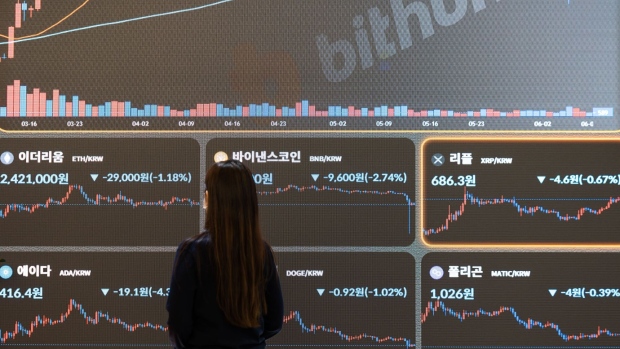Apr 5, 2024
South Korean Party Pledges Access to US Bitcoin ETFs in Race for Votes
, Bloomberg News

(Bloomberg) -- Campaigning in South Korea’s parliamentary election has underlined the nation’s status as one of the world’s largest crypto markets, with both major political parties touting related inducements to win votes.
President Yoon Suk Yeol’s People Power Party has vowed to delay a digital-asset tax, while the opposition Democratic Party pledged to lift curbs on exchange-traded funds — including US Bitcoin products — that directly hold tokens.
“We’re going to allow the ETFs, whether domestic or overseas,” Democratic Party policy specialist Hwanseok Choi said, citing its manifesto. Hwanseok, a member of the party’s think tank, participated in drawing up the manifesto.
Yoon is seeking to wrest control of the legislature in the April 10 poll from a progressive camp led by the Democratic Party. Official figures show that more than 6 million South Koreans — over 10% of the population — participated in the crypto market via registered exchanges in the first half of last year. That represents a sizable pool of potential voters in a pivotal election.
ETF Controversy
The US in January gave the green light for ETFs investing directly in Bitcoin, and the products have amassed total assets of about $57 billion so far. South Korea’s securities regulator quickly said brokering the products locally may violate the law, effectively choking a potential efflux of speculative cash.
The move stoked some confusion and roiled a slew of stocks. The People Power Party’s manifesto doesn’t dwell on the controversy, instead promising to delay planned taxes on crypto gains beyond the scheduled timeframe of 2025.
South Koreans have been active in the latest digital-asset bull market and are famed for their ardor for smaller cryptocurrencies, not just market-leader Bitcoin. Upbit, the biggest domestic crypto exchange, regularly ranks among the top platforms globally for trading volume.
Korea Securities Depository data show South Koreans last month poured more than $200 million into the shares of US-listed Bitcoin holder MicroStrategy Inc. They also flocked to US crypto-futures ETFs, which are permitted products.
Even election candidates have exposure: some 7% own crypto, according to a Yonhap report that analyzed asset disclosures.
Crypto Risks
The flip side of such speculative animus is that crypto is a highly risky sector — the nation infamously spawned Do Kwon and his doomed Luna and TerraUSD tokens, which blew up more than $40 billion when they imploded in 2022.
But memories of the wipeout, which impacted hundreds of thousands of people, are being overshadowed by this year’s $900 billion jump in the crypto market. A dedicated investor-protection framework comes into effect in July, and both parties have indicated they would also pursue wider regulation for the industry.
Along with the sops floated by politicians, that points to the possibility of greater acceptance of digital assets in South Korea, echoing a broader Asian trend. In contrast, many US officials are hostile to crypto.
Expectations are growing that spot-crypto ETFs will eventually be allowed, adding to the potential for the crypto market to be more “widely established as an investment asset” in South Korea, Hanwha Investment & Securities Co.’s alternative asset analyst Yumin Kim wrote in a recent note.
©2024 Bloomberg L.P.





